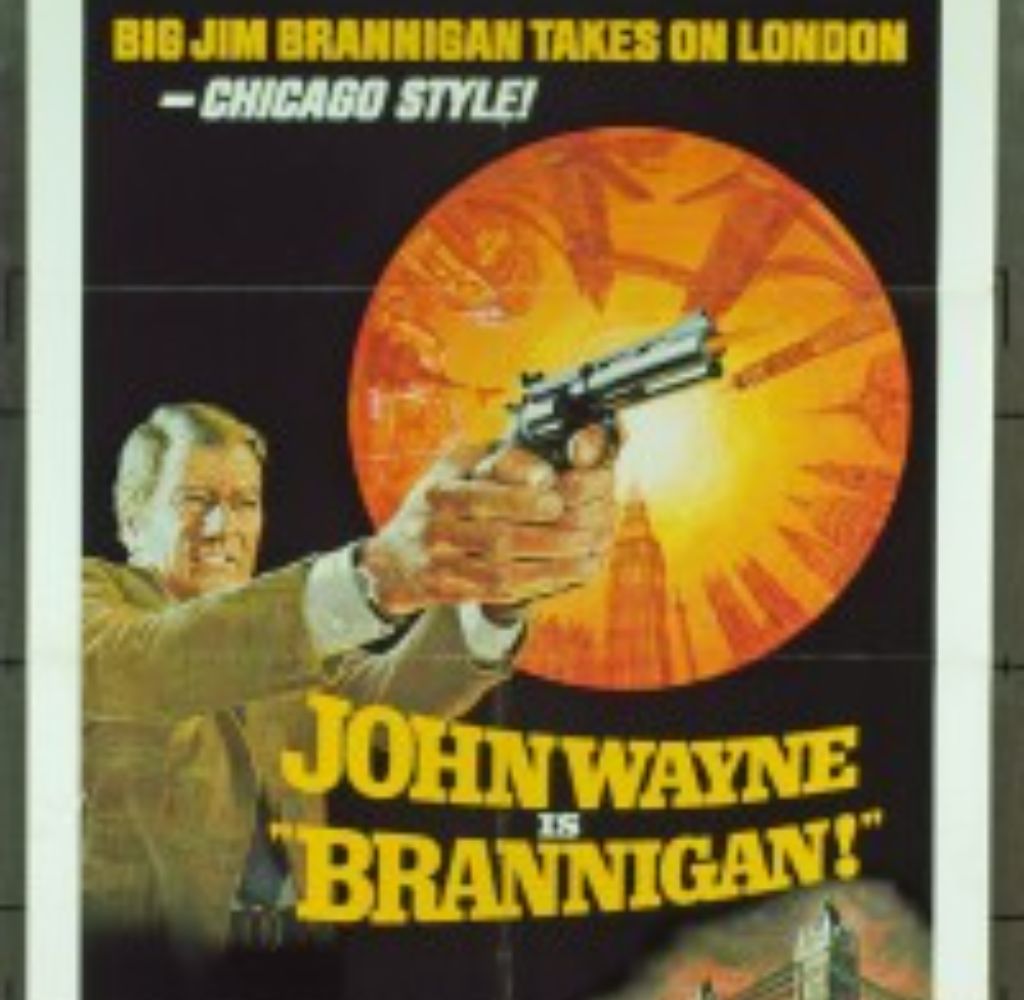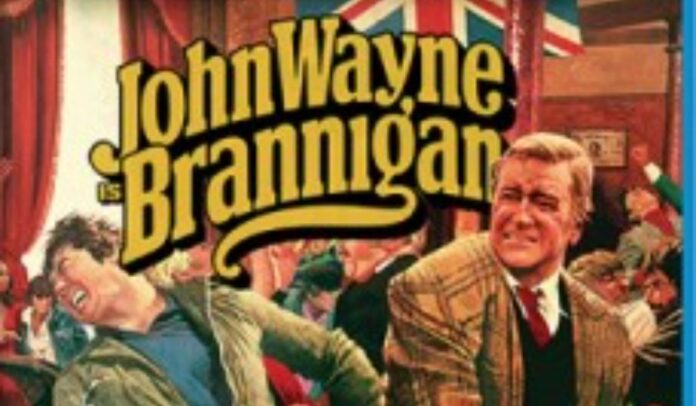Experience the action-packed charm of John Wayne’s ‘Brannigan’ (1975) with this enhanced Blu-ray edition’s vivid presentation.
“Brannigan” (1975) receives a noteworthy Blu-ray review, offering audiences a chance to revisit this action-packed film.
Starring John Wayne as the titular character, a tough Chicago cop, the Blu-ray promises a crisp and enhanced viewing experience.
The review delves into the film’s exciting narrative and the visual improvements brought about by the high-definition format, making it a compelling addition to any film enthusiast’s collection.
Blu-ray Review: “Brannigan” (1975)
“Knock knock”
Brannigan (1975) serves as a delightful indulgence. John Wayne, in one of his final films—Rooster Cogburn (1975) and The Shootist (1976)—portrays a Chicago cop in London, a concept influenced by the triumph of Dirty Harry (1971), a role initially declined by Wayne.
However, Dirty Harry thrived, grossing $36 million domestically against a $4 million budget.
This occurred when Wayne’s films were modestly successful. Despite imitating Dirty Harry, Brannigan uniquely blends a fish-out-of-water scenario, which is evident in its inspiration and offers a distinctive and enjoyable cinematic experience.
Wayne offered McQ (1974) in response, a film reminiscent of Dirty Harry but considerably less enjoyable than the absurdly over-the-top and sentimentally poignant yet unrelated Brannigan.
Critics, both then and now, tend to unfavorably compare both movies to Clint Eastwood’s now-dated Dirty Harry series (with all but the first of the five films being nearly unwatchable today).
The unconventional setting and entertaining clashes of cultures are positive aspects, and Brannigan is more laid-back and less imitative of Dirty Harry, despite its premise resembling another Eastwood film, Coogan’s Bluff (1969).
Wayne, aged 67 at the time and appearing much older with his deeply-lined features, substantial stomach, and unconvincing toupee, is scarcely believable as an active police officer.
However, some amusing lines of dialogue (“Get Brannigan! Use a forklift if you have to!”) cleverly address these concerns.

At the same time, his relationship with co-star Judy Geeson is thankfully more paternal than romantic.
MGM has the rights to this United Artists release and has subsequently licensed their video master to Twilight Time.
Although there are some commendable extra features, the transfer must be updated and insufficient. It’s not terrible, but it falls into the category of “I guess it looks a little better than the DVD,” as demonstrated by the high-definition trailer also included.
Utilizing inferior source elements, the trailer is noticeably sharper and brighter than the feature presentation.
MGM possesses the rights to this release from United Artists. Subsequently, they have granted a license for their video master to Twilight Time.
While there are commendable extra features, the transfer seems aged and inadequate.
It’s not awful, but it falls into the category of “I suppose it looks marginally better than the DVD,” as illustrated by the high-definition trailer.
Due to inferior source elements, the trailer is noticeably sharper and brighter compared to the feature presentation.
The film commences in Chicago (although Detective Lieutenant Lon “McQ” McHugh was based in Seattle), where Police Lieutenant Jim Brannigan (played by Wayne) forcefully enters a room, interrupting a small-time counterfeiter at work.
With his characteristic John Wayne deadpan, Brannigan quips, “Knock knock.”
He is looking for the notorious racketeer Ben Larkin (portrayed by John Vernon, who played the Mayor of San Francisco in Dirty Harry).
However, Larkin, facing a grand jury indictment, has already fled to London. Scotland Yard Commander Sir Charles Swann (played by Richard Attenborough) is prepared to apprehend and deport the underworld kingpin.
Brannigan’s superior, Captain Moretti (played by Ralph Meeker), assigns Big Jim to the next flight heading to London.
Upon arrival, Detective Sergeant Jennifer Thatcher (Judy Geeson), who serves as Brannigan’s driver and liaison officer, is there to greet him.
However, as Brannigan sets foot in London, the self-assured and bold Larkin is abducted by two thugs (one being James Booth from Zulu and Del Henney from Straw Dogs).
These criminals demand a hefty ransom from Larkin’s attorney, Mel Ferrer, and demonstrate their seriousness by mailing one of Larkin’s severed fingers to Scotland Yard.
Simultaneously, a hired hitman (Daniel Pilon) from Larkin’s connections in Chicago makes multiple elaborate attempts on Brannigan’s life.
The cinematic representation of the Old West remains relatively unchanged as Wayne himself ages.
Conversely, it’s somewhat disconcerting to see him in contemporary London, attempting daring feats like jumping the drawbridge of Tower Bridge in a yellow Ford Capri.
The film strives to be a Western fish-out-of-water tale set in modern times, even going to the extent of staging an entirely unnecessary and comical barroom brawl (the instigation of which is unclear) that, aside from the bowler hats and pints of Guinness, could be straight out of McLintock! (1963).
The film is most engaging when observing the British characters’ reactions of dismay, disgust, or bemusement to Brannigan’s overt American confidence (he insists on carrying his blatantly illegal handgun, almost instructing a shocked Sir Charles to leave) and vice versa.
On the other hand, Sir Charles might have become a painful stereotype, resembling an English version of John Vernon’s central character from Dirty Harry.
However, Attenborough adeptly underplays his role, alternating between amusement and puzzlement at the oversized American, occasionally losing his composure but ultimately helpless against Brannigan’s clumsy interference.
Geeson, 41 years Wayne’s junior, is well-suited for her role, convincingly efficient and amiable yet performing a duty. She and Wayne share a better rapport than many of Wayne’s female co-stars in his later career.
Directed by Douglas Hickox, known for an eclectic range of credits, including the horror-black comedy Theatre of Blood (1973), considered one of Vincent Price’s best films.
Soon after, Hickox directed the underrated prequel to Zulu, titled Zulu Dawn (1979), which, despite positive reviews, struggled at the box office. Hickox transitioned to television and passed away prematurely in 1988.
The film features several noteworthy action sequences, including an excellent car chase marred only by the final stunt, clearly manipulated through optical or miniature effects.
Despite his age and weight, Wayne still delivers visually striking punches in his old age, and behind-the-scenes home movies filmed by Geeson during the climax suggest Wayne may have exerted influence in various aspects, including the portrayal of his character.
The locations are effectively utilized, with scenes in Piccadilly Circus showcasing marquees advertising The Sting and The Great Gatsby.
The nearby Piccadilly Theatre promotes A Streetcar Named Desire, starring Claire Bloom and Martin Shaw, adding a contextual touch to the setting.
The bonus features include an audio commentary by Judy Geeson, guided by Nick Redman.
The mentioned home movies are confined to footage from the shooting of the climactic scene, offering an intriguing glimpse into Wayne’s distinctive approach to filming such sequences.
An isolated score track showcases Dominic Frontiere’s often derivative music, with certain scenes reminiscent of cues composed by Jerry Goldsmith for Planet of the Apes and others resembling Shaft’s music.
Julie Kirgo contributes insightful liner notes, and there’s a visually superior trailer compared to the film.
While not a stellar movie, Brannigan is more entertaining than one might anticipate. A lackluster transfer somewhat diminishes its impact but still provides much enjoyment.

